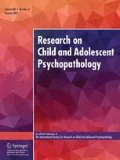Abstract
We employed a learned helplessness paradigm to compare the performance of 23 boys with attention-deficit hyperactivity disorder (ADHD) and a comparable group of 22 nonreferred boys. The boys attempted to solve two different sets of 10 find-a-word puzzles, one set following exposure to solvable puzzles, and one set following exposure to insolvable puzzles. Results revealed that the ADHD boys solved significantly fewer puzzles than did the control boys. In addition, the ADHD boys gave up on significantly more puzzles, and this was especially true following the insolvable condition when it occurred during the second set of puzzles. The ADHD boys also reported being more frustrated by the task than were the control boys. Finally, among the control boys, support was obtained for Diener and Dweck's (1978) distinction between mastery-oriented and helpless children. However, this distinction did not appear to operate in the same fashion for the ADHD boys.
Similar content being viewed by others
References
American Psychiatric Association. (1987).Diagnostic and statistical manual of mental disorders (3rd ed., rev.). Washington, DC: Author.
August, G. J. (1987). Production deficiencies in free recall: A comparison of hyperactive, learningdisabled, and normal children.Journal of Abnormal Child Psychology, 15, 429–440.
Barkley, R. A., & Cunningham, C. E. (1979). The effects of methylphenidate on the motherchild interactions of hyperactive children.Archives of General Psychiatry, 36, 201–208.
Borcherding, B., Thompson, K., Kruesi, M., Bartko, J., Rapoport, J. L. & Weingartner, H. (1988). Automatic and effortful processing in attention deficit/hyperactivity disorder.Journal of Abnormal Child Psychology 16, 333–345.
Crandall, V. C., Katkovsky, W., & Crandall, V. J. (1965). Children's beliefs in their own control of reinforcements in intellectual-academic achievement situations.Child Development, 36, 91–109.
Cunningham, C. E., Seigel, L. S., & Offord, D. R. (1985). A developmental dose-response analysis of the effects of methylphenidate on the peer interactions of attention deficit disordered boys.Journal of Abnormal Child Psychology, 26, 955–972.
Diener, C. I., & Dweck, C. S. (1978). An analysis of learned helplessness: Continuous changes in performance, strategy, and achievement cognitions following failure.Journal of Personality and Social Psychology, 39, 940–952.
Diener, C. I., & Dweck, C. S. (1980). An analysis of learned helplessness: II. The processing of success.Journal of Personality and Social Psychology, 39, 940–952.
Douglas, V. I. (1983). Attentional and cognitive problems. In M. Rutter (Ed.),Developmental neuropsychiatry (pp. 280–329). New York: Guilford Press.
Dweck, C. S. (1975). The role of expectations and attributions in the alleviation of learned helplessness.Journal of Personality and Social Psychology, 31, 674–685.
Dweck, C. S., Goetz, T. E., & Strauss, N. L. (1980). Sex differences in learned helplessness: IV. An experimental and naturalistic study of failure generalization and its mediators.Journal of Personality and Social Psychology, 38, 441–452.
Dweck, C. S., & Leggett, E. L. (1988). A social-cognitive approach to motivation and personality.Psychological Review, 95, 256–273.
Goyette, C. H., Conners, C. K., & Ulrich, R. F. (1978). Normative data on revised Conners Parent and Teacher Rating Scales.Journal of Abnormal Child Psychology, 6, 221–236.
Harris, M. J., Milich, R., Johnston, E. M., & Hoover, D. W. (1990). Effects of expectancies on children's social interactions.Journal of Experimental Social Psychology, 26, 1–12.
Henker, B., & Whalen, C. K. (1989). Hyperactivity and attention deficit.American Psychologist, 44, 216–223.
Licht, B. G., & Dweck, C. S. (1984). Determinants of academic achievement: The interaction of children's achievement orientations and skill area.Developmental Psychology, 20, 628–636.
Licht, B. G., & Kistner, J. A. (1986). Motivational problems of learning-disabled children: Individual differences and their implications for treatment. In J. K. Torgesen & B. Y. L. Wong (Eds.),Psychological and educational perspectives on learning disabilities (pp. 225–255). New York: Academic Press.
Licht, B. G., Kistner, J. A., Ozkaragoz, T., Shapiro, S., & Clausen, L. (1985). Causal attributions of learning disabled children: Individual differences and their implications for persistence.Journal of Educational Psychology, 77, 208–216.
Milich, R., Carlson, C. L., Pelham, W. E., & Licht, B. G. (1991). Effects of methylphenidate on the persistence of ADHD boys following failure experiences.Journal of Abnormal Child Psychology, 19, 519–536.
Milich, R., & Landau, S. (1982). Socialization and peer relations in hyperactive children. In K. D. Gadow & I. Bialer (Eds.),Advances in learning and behavioral disabilities (Vol. 1, pp. 283–339). Greenwich, CT: JAI Press.
Reid, M. K., & Borkowski, J. G. (1987). Causal attributions of hyperactive children: Implications for teaching strategies and self-control.Journal of Educational Psychology, 79, 296–307.
Schunk, D. H., Hanson, A. R., & Cox, P. D. (1987). Peer-model attributes and children's achievement behaviors.Journal of Educational Psychology, 79, 54–61.
Whalen, C. K., Henker, B., & Dotemoto, S. (1981). Teacher response to the methylphenidate (Ritalin) versus placebo status of hyperactive boys in the classroom.Child Development, 52, 1005–1014.
Author information
Authors and Affiliations
Additional information
The auhors thank Caryn Carlson and William Pelham for their help in creating the task stimuli and Monica Harris and Steven Landau for their helpful comments.
Rights and permissions
About this article
Cite this article
Milich, R., Okazaki, M. An examination of learned helplessness among attention-deficit hyperactivity disordered boys. J Abnorm Child Psychol 19, 607–623 (1991). https://doi.org/10.1007/BF00925823
Revised:
Issue Date:
DOI: https://doi.org/10.1007/BF00925823




